The Crucial Role of Emotional Insight in Recovery
Emotional insight—the ability to recognize, accept, and manage one's emotional experiences—is essential in the journey through substance abuse and mental health recovery. Integrating emotional insight in treatment not only enhances self-awareness but also supports healthier emotional regulation, which is vital for sustaining long-term healing. This article explores what emotional insight entails, how it supports healing, and the comprehensive treatment approaches that harness its power to transform lives affected by addiction and mental health disorders.
Defining Emotional Insight and Its Components
What is Emotional Insight?
Emotional insight in psychiatry refers to the process of not only recognizing the presence of mental illness (psychical insight) but also accepting and emotionally integrating this reality (emotional insight). This acceptance plays a crucial role in managing conditions and fostering recovery.
Psychical vs. Emotional Insight
Psychical insight involves the intellectual acknowledgment of one's mental health condition, essentially realizing that an illness is present. Emotional insight, on the other hand, goes deeper—it means embracing this recognition on an emotional level, allowing one's feelings to align with this understanding, which supports rehabilitation and adherence to treatment.
How Does Empathy Contribute to Emotional Insight?
Empathy is central to developing emotional insight. It engages multiple complex processes, including visuo-spatial perspective-taking (seeing oneself from another's viewpoint), embodiment (feeling within one's body), and both affective and cognitive responses. Together, these enable a person to experience and understand their condition more fully.
What Are Objectification and Subjectification?
Two important empathic processes support emotional insight. The first, objectification, is the ability to adopt an external perspective towards oneself—essentially seeing oneself as an object. This is achieved through heterocentered perspective-taking and embodiment and aids in the intellectual recognition of mental illness.
The second, subjectification, involves emotional empathy, reinforcing internal emotional acceptance of the illness. It helps align the emotional system with the recognition achieved through objectification, encouraging a true internal acceptance that goes beyond just cognitive realization.
Together, these processes help form a multidimensional insight that is crucial in psychiatric care and addiction treatment, enhancing the person's capability to manage their illness effectively.
The Neuroscience Behind Insight in Mental Health
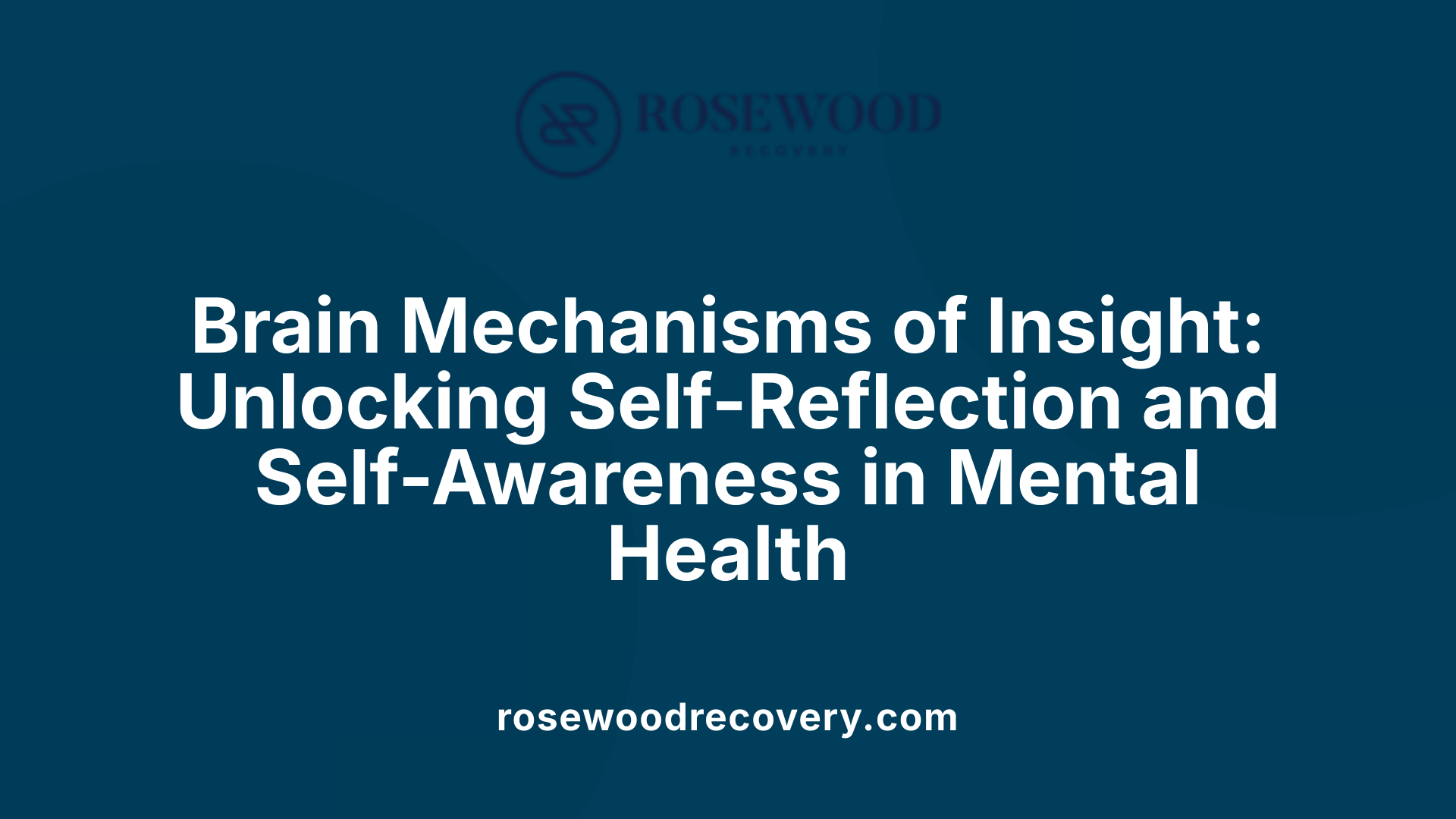
How do self-reflection and empathic capacities contribute to insight in mental health?
Insight in psychiatric conditions involves recognizing and accepting the presence of mental illness, relying heavily on intact self-reflection and empathy. Self-reflection enables individuals to observe themselves objectively, while empathy integrates processes like visuo-spatial perspective-taking and affective/cognitive responses. This empathic heterocentered perspective-taking and embodiment foster a process called objectification, allowing one to adopt an objective viewpoint on oneself. Simultaneously, emotional insight or acceptance arises from subjectification—empathic affective processes that align one's emotions with the recognition of illness.
What role does the Default Mode Network play in self-referential and introspective processes related to insight?
Functional abnormalities in the brain's Default Mode Network (DMN), which supports self-referential thinking and introspection, have been linked to lack of insight in mental illnesses. Since DMN activity underlies the processes needed for self-awareness and self-reflection, its dysfunction can disrupt the individual's ability to recognize and emotionally accept their condition.
Which neuronal mechanisms are associated with insight?
Insight assessment is multidimensional—psychical, somaesthetic, and emotional—each influenced by clinical states and underlying neuronal circuits. Neuronal processes involving empathy and self-awareness, coordinated through networks like the DMN, facilitate the complex integration of cognitive and emotional information required for insight. Thus, these brain circuits enable mental illness recognition and acceptance by harmonizing cognitive reflection with affective responses.
How does insight vary across different psychiatric disorders?
Lack of insight is not limited to psychotic disorders but is seen across schizophrenia, obsessive-compulsive disorder, substance use disorders, and more. Insight fluctuates over time, correlating with symptom severity and clinical state rather than constituting a stable trait. This variability highlights insight as a dynamic process influenced by ongoing changes in brain function and psychological state.
| Aspect | Description | Neural/Cognitive Basis |
|---|---|---|
| Self-reflection & Empathy | Enables objective self-view and emotional acceptance | Integration of visuo-spatial perspective, affective/cognitive processes |
| Default Mode Network | Supports introspection and self-referential thinking | Functional activity linked to insight |
| Insight Variability | Changes with clinical symptoms and over disease course | Dynamic neuronal and psychological states |
This neuroscience perspective underscores that facilitating insight requires addressing both cognitive self-reflection and emotional processing supported by key brain networks.
Emotional Dysregulation and Its Impact on Addiction
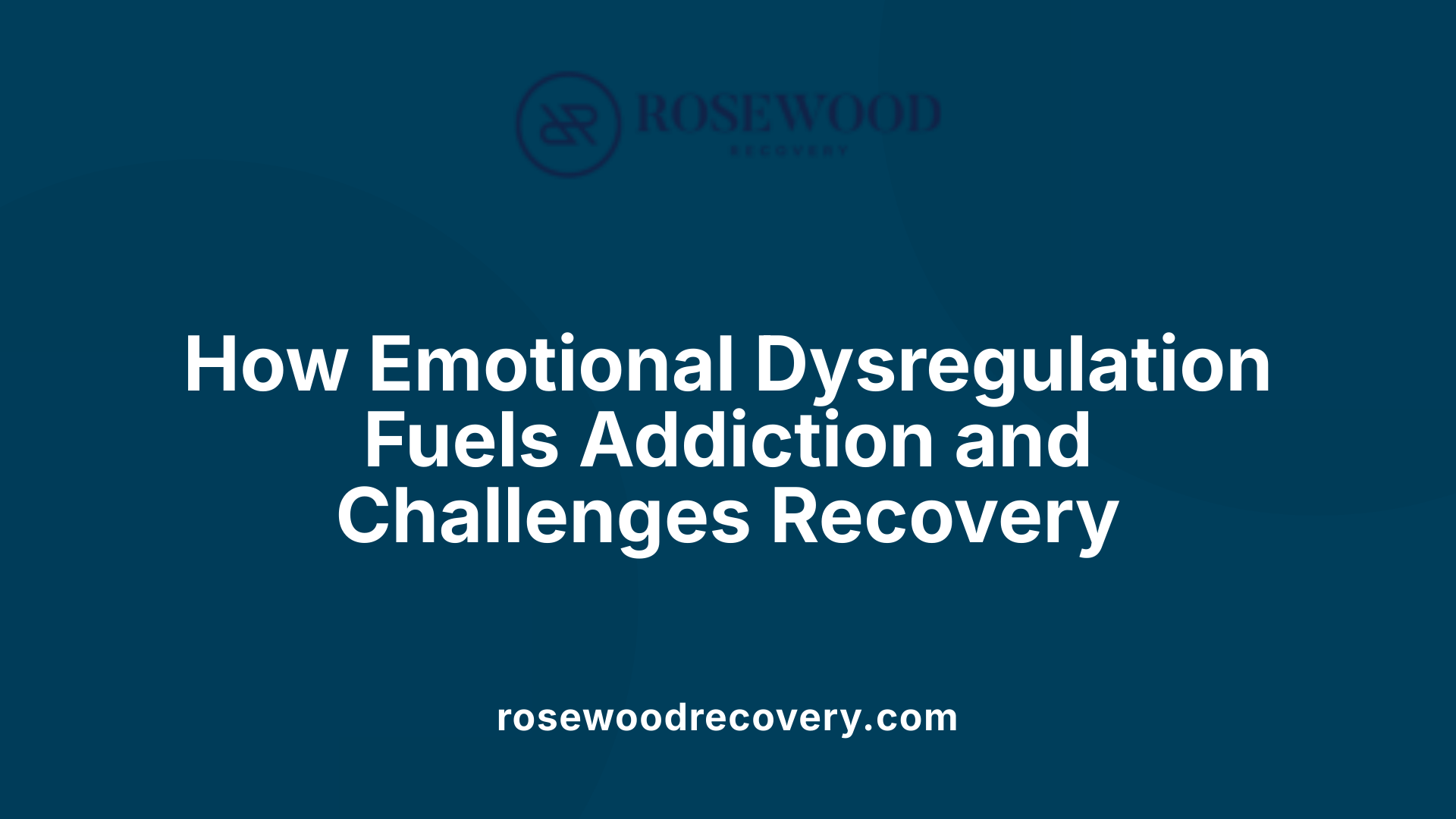
What Role Does Emotional Dysregulation Play in Addiction Development?
Emotional dysregulation is a significant factor in the development and persistence of addiction. It involves difficulties in recognizing, understanding, and managing emotions appropriately, often leading to a loss of control over drug intake and compulsive usage patterns. Many individuals with substance use disorders (SUDs) use substances to cope with overwhelming negative emotions, trauma, or ongoing stress, making emotional dysregulation central to both the beginning and continuation of addictive behaviors.
How Does Emotional Sensitivity Affect Vulnerability to Addiction?
Increased emotional sensitivity, especially among young individuals, can heighten vulnerability to addiction. Young people with heightened responsiveness to emotional stimuli may find substances appealing as a means to amplify positive feelings or dull negative ones. This drive to modulate emotional states with substances elevates the risk of developing compulsive drug use.
What Is the Impact of Stress, Trauma, and Circadian Rhythm Disruption?
Stress and trauma play pivotal roles in emotional dysregulation, frequently triggering or exacerbating addictive behaviors. Disruptions to the circadian rhythm further affect mood and behavior adversely during abstinence or withdrawal phases. These factors interact synergistically with substance use, making emotional regulation particularly challenging and increasing the likelihood of relapse.
How Are Behavioral Addiction and Emotional Traits Connected?
Behavioral addictions, such as social media addiction, are also linked to emotional dysregulation. Negative emotional states and traits like impulsivity, low self-esteem, anxiety, and social anxiety raise the risk for these addictive behaviors. This demonstrates that challenges in emotional regulation extend beyond substance use disorders to other compulsive behaviors driven by managing difficult emotions.
Comprehensive Treatment Services for Substance Abuse and Mental Health
What comprehensive treatment services are available for substance abuse and mental health issues?
Comprehensive treatment for substance abuse and mental health integrates multiple approaches tailored to individual needs. These services begin with medical detoxification provided in safe, round-the-clock residential settings, addressing physical dependence and withdrawal symptoms.
Following detox, multidisciplinary therapies engage patients through individual, group, and family counseling led by licensed therapists. Medication-assisted treatment (MAT) targets opioid and alcohol addiction using medicines like methadone, buprenorphine, naltrexone, disulfiram, and acamprosate to support sustained abstinence.
Psychiatric care is vital for co-occurring mental health disorders such as depression, anxiety, or psychosis. Treatment plans incorporate behavioral therapies such as Cognitive Behavioral Therapy (CBT), Dialectical Behavior Therapy (DBT), mindfulness, and emotion-focused approaches, improving emotional regulation and relapse prevention.
Trauma-informed and culturally competent care ensures sensitivity to patient histories and backgrounds, fostering a safe healing environment. Social supports include peer recovery coaching, family therapy, and community support groups, addressing social determinants that affect recovery success.
Access to these comprehensive services is facilitated by resources like FindTreatment.gov, which connects individuals to local treatment centers. Crisis helplines such as 988 offer immediate support and guidance. This integrated system provides continuous and coordinated care, critical for long-term recovery and improved quality of life.
Integrating Care for Co-occurring Disorders in Addiction Treatment
How do addiction treatment programs integrate care for both substance abuse and mental health disorders?
Addiction treatment programs commonly adopt a dual diagnosis approach, also known as co-occurring disorders treatment, to manage individuals facing both substance abuse and mental health challenges concurrently. This integrated care model starts with comprehensive, coordinated assessments designed to identify the presence and severity of both substance use and psychiatric conditions.
Following assessment, personalized treatment plans are developed. These plans combine psychosocial therapies—such as Cognitive Behavioral Therapy (CBT), Dialectical Behavior Therapy (DBT), and emotion-focused therapies—with medication management tailored for both addiction and mental health symptoms. For example, pharmacological agents like methadone or buprenorphine may be used for opioid addiction, while antidepressants or antipsychotics address underlying psychiatric disorders.
Treatment is delivered across multiple formats, including individual counseling, group therapy, family involvement, and self-help programs, promoting a holistic approach that attends to emotional regulation, relapse prevention, and social support. Practitioners trained in both psychiatric and addiction care coordinate efforts to foster engagement and optimize outcomes, such as reduced substance use, symptom relief, and enhanced psychosocial functioning.
Specialized programs dedicated to co-occurring disorders have become increasingly prevalent. Supported by agencies like SAMHSA, these programs emphasize integrated, accessible, and culturally sensitive treatment to meet diverse patient needs effectively.
| Component | Description | Impact on Treatment |
|---|---|---|
| Dual Diagnosis Approach | Simultaneous treatment of mental illness and substance abuse | Improves overall recovery rates and reduces relapse |
| Coordinated Assessments | Comprehensive screening for psychiatric and substance use disorders | Allows tailored, individualized treatment planning |
| Psychosocial Therapies & Medication | Combines evidence-based therapies and appropriate pharmacologic treatment | Enhances emotional regulation and manages cravings effectively |
| Specialized Programs | Dedicated services designed for co-occurring disorders | Provides culturally competent, holistic support |
This integrated care approach is crucial, given the complex interplay between emotional dysregulation, mental illness, and addiction, reinforcing that treatment addressing both domains simultaneously is essential for sustainable recovery.
Therapeutic Approaches Enhancing Emotional Insight in Addiction Recovery
What Types of Therapies Are Most Effective in Treating Various Forms of Addiction?
Effective treatment for addiction often requires a multifaceted approach combining different psychotherapeutic techniques that enhance emotional insight and regulation. Among the most prominent are Cognitive Behavioral Therapy (CBT), Dialectical Behavior Therapy (DBT), Emotion-Focused Therapy (EFT), and expressive arts therapy alongside mindfulness practices.
Cognitive Behavioral Therapy (CBT)
CBT aids individuals in recognizing and challenging negative thought patterns that drive emotional distress and substance use. By targeting underlying cognitive distortions, CBT promotes healthier coping strategies and reduces cravings. It empowers patients to develop resilience against triggers and manage urges through practical behavioral changes.
Dialectical Behavior Therapy (DBT)
DBT offers a structured framework to manage intense emotions often experienced in addiction. It teaches skills in distress tolerance, emotional regulation, interpersonal effectiveness, and mindfulness. These tools help individuals sustain recovery by enhancing awareness of emotional states and improving relationships, which are critical in reducing relapse risks.
Emotion-Focused Therapy (EFT)
EFT helps patients explore and process deep-seated emotional experiences that may underpin addictive behaviors. Through acknowledgment and understanding of these feelings, individuals can work through emotional pain and find healthier outlets, breaking negative cycles tied to substance use.
Expressive Arts Therapy and Mindfulness
Expressive arts therapy utilizes creative outlets like art, music, and dance to facilitate emotional expression and processing. Combined with mindfulness and meditation, these therapies cultivate self-awareness, emotional regulation, and a more grounded presence—essential for sustaining sobriety.
Together, these therapies enhance emotional insight by integrating recognition and acceptance of feelings, which supports a more stable and conscious recovery journey. Tailored intervention combining these approaches with medication-assisted treatment and support networks results in a comprehensive strategy addressing both psychological and physiological aspects of addiction.
Medication-Assisted Treatments (MAT): Supporting Emotional Regulation and Recovery
What role do medication-assisted treatments play in managing addiction and mental health conditions?
Medication-assisted treatments (MAT) combine FDA-approved medications with counseling and behavioral therapies to support individuals recovering from addiction and co-occurring mental health conditions. MAT helps reduce cravings and manage withdrawal symptoms by normalizing brain chemistry and blocking the rewarding effects of substances such as opioids, alcohol, and tobacco. This dual approach decreases illicit drug use and the risk of overdose, facilitating a safer recovery process.
The impact of MAT extends beyond craving reduction. By stabilizing mental health symptoms and alleviating physical dependence, MAT creates a foundation for individuals to engage more fully in therapy and rebuild their lives. Research shows that MAT increases treatment retention, improves survival rates, and lowers criminal activity related to substance use disorders.
Despite these proven benefits, access to MAT can be limited due to stigma surrounding medication use in addiction treatment and insufficient healthcare capacity. Expanding access to evidence-based MAT options is critical to enhancing recovery outcomes and supporting emotional regulation throughout the recovery journey.
| Aspect | Role and Benefit | Impact on Recovery |
|---|---|---|
| Craving and Withdrawal | Medications reduce cravings and ease withdrawal symptoms | Helps maintain abstinence and prevent relapse |
| Mental Health Stabilization | Normalizes brain chemistry and eases dependence | Enables emotional regulation and effective participation in therapy |
| Treatment Retention | Increases engagement and duration of treatment | Leads to sustained recovery and lowered relapse rates |
| Challenges | Limited access due to stigma and resource constraints | Necessitates policy and healthcare system improvements |
Emotional Regulation Techniques in Addiction Treatment
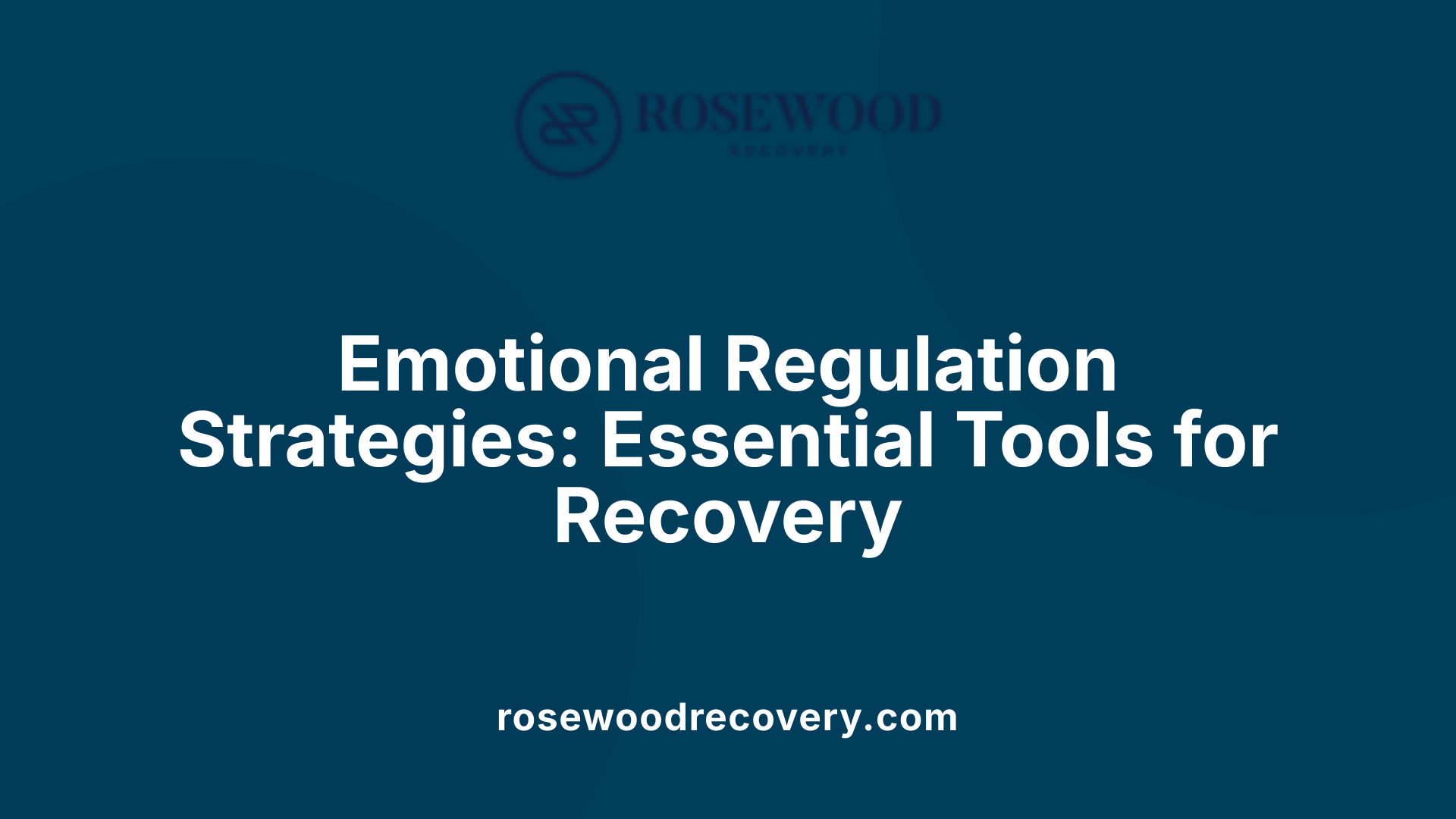
What are key emotional regulation techniques used in addiction treatment?
Several evidence-based techniques are widely used to enhance emotional regulation among individuals recovering from addiction. Mindfulness and meditation practices cultivate present-moment awareness, reduce stress, and help manage cravings by increasing emotional awareness and self-control. Cognitive-Behavioral Therapy (CBT) focuses on identifying and challenging negative thought patterns that contribute to emotional distress and substance use, thereby fostering healthier coping mechanisms.
Dialectical Behavior Therapy (DBT) equips patients with skills like distress tolerance, emotional regulation, interpersonal effectiveness, and mindfulness to handle intense emotions and improve relationships. Emotion-focused therapy (EFT) helps patients process and understand their feelings, addressing core emotional issues that may drive addictive behaviors. Expressive arts therapies utilize creative outlets such as music, art, and dance to facilitate emotional expression and processing.
How are these techniques tailored to address specific substance use issues?
Emotional regulation strategies are adapted to meet the unique challenges associated with different substances. In alcohol and drug rehabilitation, techniques focus on building resilience, identifying environmental and emotional triggers, and reducing cravings specific to each substance. For example, mindfulness can be directed toward recognizing early signs of craving in opioid dependence, while CBT can target thought distortions commonly linked to alcohol abuse.
Such tailored approaches enable individuals to develop personalized coping strategies conducive to sustained recovery. By addressing the emotional and behavioral nuances of various substance use disorders, therapy becomes more effective in preventing relapse and supporting long-term emotional stability.
How do these techniques improve treatment outcomes?
Across several modalities, developing emotional regulation skills empowers individuals to manage life stressors without resorting to substance use. Mindfulness and meditation research indicates their effectiveness in reducing cravings and enhancing emotional control. CBT aids in restructuring dysfunctional thinking associated with emotional turmoil, while DBT improves tolerance to distressing emotions.
Emotion-focused and expressive therapies further foster emotional insight and healing. Collectively, these methods contribute to increased treatment adherence, reduced relapse rates, and healthier emotional functioning in people recovering from addiction.
| Technique | Purpose | How it Works |
|---|---|---|
| Mindfulness & Meditation | Enhance awareness and reduce cravings | Increases present-moment focus, decreases stress and impulse |
| Cognitive-Behavioral Therapy (CBT) | Challenge negative thoughts and improve coping | Identifies distorted thinking patterns that lead to substance use |
| Dialectical Behavior Therapy (DBT) | Manage intense emotions, improve relationships | Teaches distress tolerance, emotion regulation, mindfulness |
| Emotion-focused Therapy (EFT) | Process and understand core emotions | Addresses unresolved feelings contributing to addiction |
| Expressive Arts Therapy | Facilitate emotional expression and healing | Uses creative outlets like art and music to express feelings |
The Interplay of Emotional Insight and Relapse Prevention
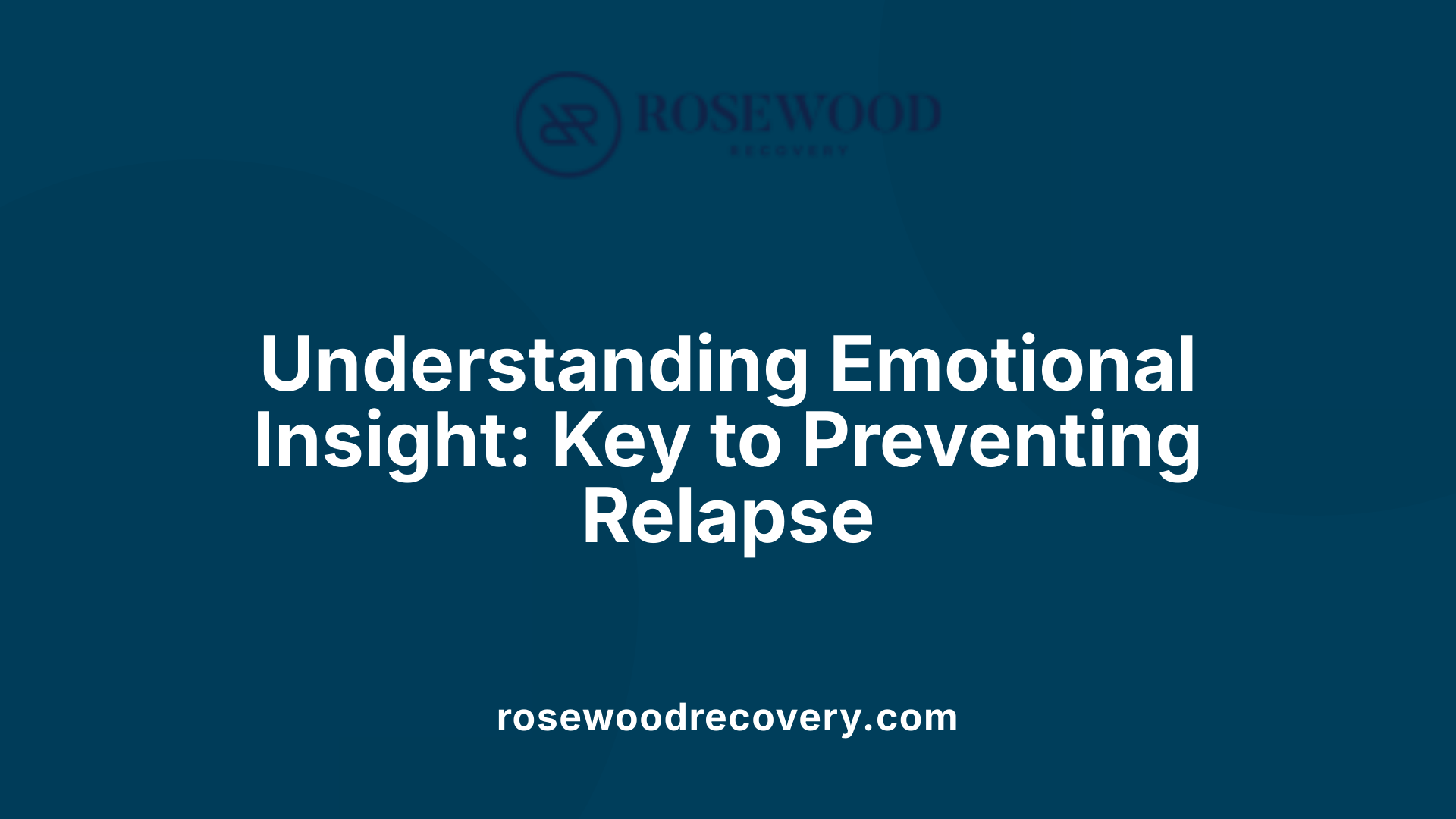
How Does Emotional Insight Relate to Coping Skills?
Emotional insight involves both recognizing and accepting mental illness, which is crucial in managing addiction recovery. When individuals develop this insight, they enhance their self-reflection and empathy capacities, allowing them to better understand their emotional states. This heightened awareness fosters healthier coping strategies, as they can identify emotional triggers and respond adaptively rather than resorting to substance use.
What Role Does Emotional Regulation Play in Preventing Relapse?
Effective emotional regulation is a cornerstone of relapse prevention. People recovering from addiction often struggle with intense emotions that previously drove substance use as a coping method. Techniques such as mindfulness, cognitive-behavioral therapy (CBT), dialectical behavior therapy (DBT), and emotion-focused therapy (EFT) help improve emotional awareness and control. These therapies enable individuals to manage cravings, reduce impulsivity, and handle stress without turning to drugs or alcohol.
Why Are Social Support and Recovery Coaching Important?
Recovery coaching and strong social support systems provide emotional stability and accountability, which reinforce emotional regulation skills and insight maintenance. Support groups, family therapy, and peer mentors help individuals feel understood and supported, decreasing feelings of isolation that can precipitate relapse. These networks also assist in reinforcing commitment to recovery goals and provide practical guidance for navigating challenges.
How Does Monitoring and Addressing Triggers Help Maintain Recovery?
Identifying and managing triggers—such as stress, circadian rhythm disruption, or exposure to drug-related cues—is vital. Comprehensive treatment programs incorporate ongoing monitoring through counseling and sometimes biological testing to detect early signs of relapse. Interventions focus on building resilience against these triggers by practicing coping techniques and adjusting treatment plans as necessary.
How Can Comprehensive Treatment Programs Support Long-Term Recovery and Relapse Prevention?
Comprehensive programs integrate medical, psychological, and social interventions tailored to the individual. Medications like naltrexone and acamprosate aid in reducing cravings, while behavioral therapies target emotional regulation and cognitive restructuring. These programs also address social determinants by providing support for housing, employment, and family dynamics. Such a holistic approach ensures emotional insight and regulation skills are continually developed and reinforced, significantly lowering relapse risk.
| Aspect | Role in Recovery | Examples/Details |
|---|---|---|
| Emotional Insight | Enhances self-awareness and acceptance | Integration of self-reflection, empathy, and acceptance of illness |
| Emotional Regulation | Enables healthy management of emotions | Mindfulness, CBT, DBT, EFT, expressive arts therapies |
| Social Support & Recovery Coaching | Provides accountability and emotional stability | Support groups, family therapy, peer mentoring |
| Triggers Monitoring | Identifies relapse risks and guides intervention | Stress management, cue exposure control, counseling, biological testing |
| Comprehensive Treatment | Combines meds, therapy, social support | Medications (naltrexone, acamprosate), behavioral therapies, housing & employment |
Together, these interconnected elements foster resilience and empower individuals to sustain long-term recovery while minimizing the chances of relapse through informed emotional insight and robust support systems.
The Psychological and Neurochemical Challenges in Addiction and Emotional Insight
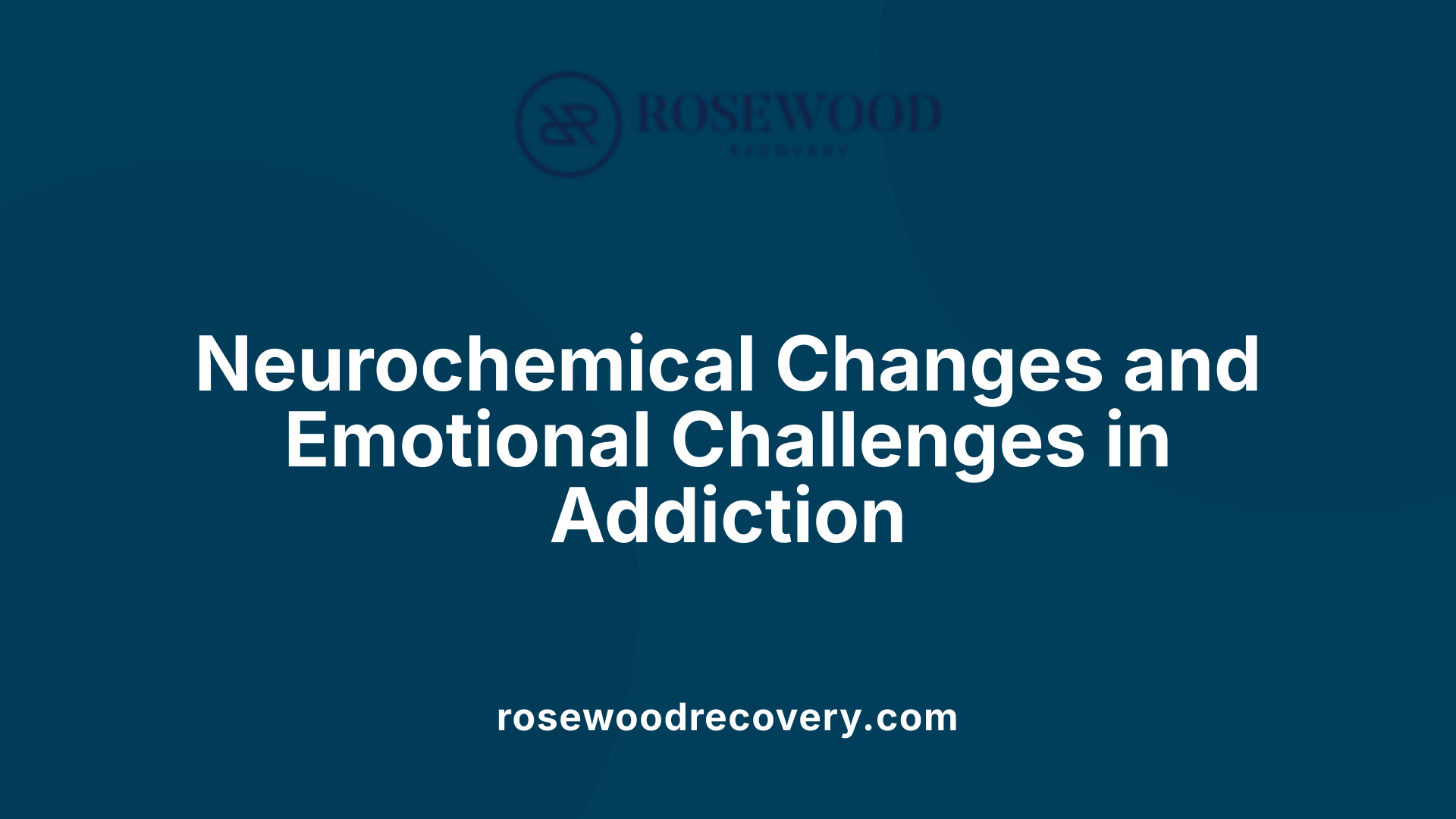
How does addiction alter brain function and reward pathways?
Addiction profoundly changes brain chemistry, particularly affecting neurotransmitters such as dopamine, serotonin, and norepinephrine. These changes occur within the brain's reward system, reinforcing the compulsive drug-seeking behavior typical of substance use disorders (SUDs). The dopamine pathways, critical for processing rewards and motivation, become dysregulated, making natural rewards less satisfying. This rewiring escalates cravings and makes cessation difficult.
What psychological effects arise from long-term drug addiction?
Chronic substance abuse often leads to emotional numbness and detachment. Individuals struggle to experience joy or maintain healthy relationships, which complicates the recovery journey. Feelings of guilt and shame frequently accompany addiction, fueling a negative feedback loop where emotional pain intensifies substance use. Additionally, anxiety symptoms such as rapid heart rate, excessive worry, and restlessness are common, further burdening emotional regulation.
How do depression and cognitive impairments relate to addiction?
Depression commonly co-occurs with addiction, presenting symptoms like hopelessness, lack of motivation, and sleep disturbances. These symptoms necessitate ongoing mental health therapies alongside addiction treatment. Furthermore, cognitive impairments including memory loss and difficulties with concentration, decision-making, and learning are prevalent among long-term drug users. These impairments may persist even after substance use has stopped, posing challenges to sustained recovery.
The profound psychological and neurochemical disruptions caused by addiction underscore the essential need for comprehensive treatment plans. These should address both the biological alterations in the brain and the complex emotional difficulties experienced, promoting emotional insight and facilitating successful recovery.
The Role of Family and Social Support in Fostering Emotional Insight and Healing
Family Therapy in Addiction Treatment
Family therapy plays a crucial role in addiction treatment by addressing the impacts of substance use on family members and improving overall family dynamics. It helps families understand the emotional challenges faced by their loved ones, fostering empathy and collective healing.
Communication Improvements
Through therapy, families learn effective communication strategies that reduce misunderstandings and conflicts. Improved dialogue creates a supportive environment where individuals struggling with addiction feel understood and less isolated, facilitating greater emotional insight and acceptance.
Social Support Networks
Beyond the family unit, social support networks provide essential encouragement and accountability. Engaging with peers and support groups offers opportunities for shared experiences, emotional validation, and practical advice in managing addiction and emotional regulation.
Building Resilience and Emotional Stability
The combined strength of family and social supports enhances resilience by promoting healthier coping mechanisms and emotional stability. This network helps individuals withstand cravings, manage stress, and prevent relapse, contributing to sustained recovery and emotional growth.
Together, family therapy and strong social support systems create a foundation for emotional insight and healing, vital for overcoming addiction and rebuilding lives.
Harnessing Emotional Insight for Sustainable Healing
Emotional insight is much more than self-awareness; it is a critical foundation for healing in substance abuse and mental health treatment. Through the integration of comprehensive, evidence-based therapies—spanning behavioral, pharmacological, and holistic approaches—patients are empowered to understand and manage their emotions effectively. Emotional regulation enhances resilience, reduces relapse risk, and fosters healthier relationships, all crucial for long-term recovery. Treatment programs that prioritize emotional insight, combined with supportive environments and ongoing care, offer the best pathway to recovery, underscoring the profound role emotional insight plays in the journey toward lasting healing.
References
- The Relation Between Empathy and Insight in Psychiatric ...
- Emotional Regulation in Addiction Treatment at Antrim, NH
- Editorial: The role of emotional dysregulation in addiction
- Substance Use Disorders
- Five Psychological Effects of Drug Addiction
- Home | SAMHSA - Substance Abuse and Mental Health ...
- Find treatment for substance use | Behavioral Health Services
- FindTreatment.gov: Home
- Relapse Prevention Strategies and Techniques for Addiction
- Addiction Relapse Prevention - StatPearls




